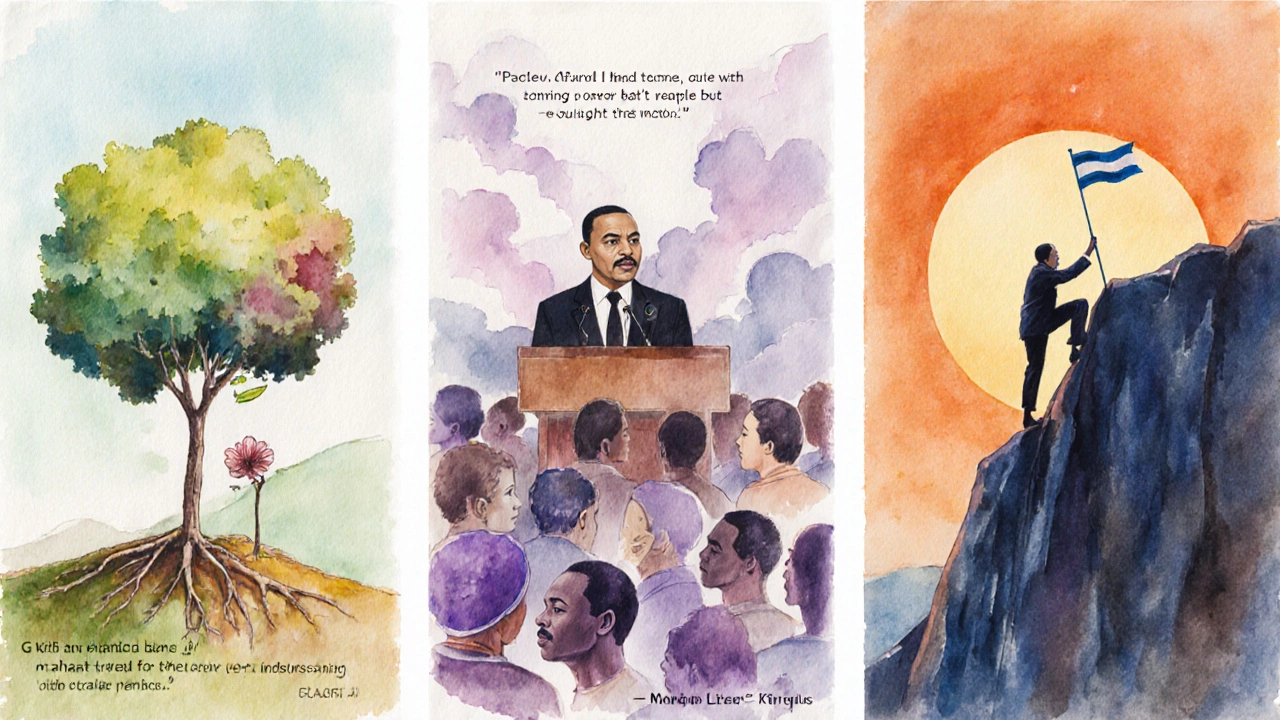Powerful Motivational Quotes: What Makes a Quote Truly Impactful

Quote Impact Calculator
How Powerful Is Your Quote?
Enter a quote to evaluate its impact based on the three key ingredients of powerful quotes: emotional resonance, universal truth, and brevity with depth.
Ever heard a line that stopped you in your tracks, made your heart race, and pushed you to act? That’s the magic of a powerful quote. It’s not just a handful of words - it’s a spark that can ignite change, lift a mood, or reshape a mindset in seconds.
What Makes a Quote Powerful?
At its core, a powerful quote packs three essential ingredients:
- Emotional resonance - it hits a feeling you already carry.
- Universal truth - the idea feels true for many, not just one person.
- Brevity with depth - a few words that hold layers of meaning.
When these three line up, the quote becomes a trigger. Science shows that emotionally charged language activates the brain’s reward system, making the message stick longer than ordinary facts (Journal of Cognitive Neuroscience, 2023).
Famous Powerful Quotes and Why They Work
Let’s break down three iconic lines, each a textbook example of the ingredients above.
Mahatma Gandhi once said, "Be the change you wish to see in the world." This quote hits emotional resonance by inviting personal responsibility, carries a universal truth about agency, and stays under ten words. The brevity forces the brain to fill in the gaps, making it memorable.
Martin Luther King Jr. famously declared, "I have a dream." Though only three words, the phrase conjures a powerful vision of equality. The emotional pull comes from the collective longing for justice; the universal truth is the hope for a better future.
Nelson Mandela reminded us, "It always seems impossible until it’s done." Here, the quote acknowledges struggle (emotional resonance), states a timeless truth about perseverance, and uses an easy‑to‑remember structure.
How to Spot a Powerful Quote
- Read it aloud. If it feels like it could be a chant or mantra, you’re on the right track.
- Check for emotional triggers - does it make you feel hope, anger, pride, or courage?
- Ask if the message applies across cultures or ages. Universal relevance is key.
- Count the words. Most powerful quotes sit between 3 and 12 words.
- Test the imagery. Strong visual or sensory language often boosts impact.
Applying this checklist quickly tells you whether a line has that "wow" factor.

Using Powerful Quotes in Everyday Life
Once you’ve collected a handful of your favorites, put them to work:
- Morning boost: Write a quote on a sticky note where you’ll see it first thing.
- Team meetings: Open with a relevant quote to set the tone.
- Social media: Pair a quote with a personal anecdote for higher engagement.
- Goal setting: Use a quote as a reminder of why you started.
Even a quick glance can reset your mindset, making the quote a practical tool, not just a decoration.
Comparison of Top Powerful Quotes
| Quote | Author | Year | Core Theme | Word Count |
|---|---|---|---|---|
| "Be the change you wish to see in the world." | Mahatma Gandhi | 1938 | Personal agency | 10 |
| "I have a dream." | Martin Luther King Jr. | 1963 | Vision of equality | 4 |
| "It always seems impossible until it’s done." | Nelson Mandela | 1994 | Perseverance | 9 |

Key Takeaways
- A powerful quote blends emotion, truth, and brevity.
- Look for universal relevance and vivid imagery.
- Use a quick checklist to vet new quotes.
- Integrate your favorites into daily routines for maximum impact.
- Famous lines from leaders like Gandhi, King, and Mandela illustrate the formula in action.
Frequently Asked Questions
Can a single sentence really change my mindset?
Yes. Psychological studies have shown that repeat exposure to concise, emotionally charged statements can rewire thought patterns within weeks. The key is consistency and personal relevance.
Do I need to credit the author every time I use a quote?
Crediting the author is best practice, especially for public or commercial use. It respects intellectual property and adds credibility to your message.
How many powerful quotes should I keep on hand?
A personal shortlist of 5‑10 quotes works well. Rotate them based on your current goals - motivation, focus, resilience, etc.
Are short slogans considered powerful quotes?
Many slogans meet the criteria of brevity, emotion, and universal truth, so they can function as powerful quotes. The main difference is intent - slogans aim to sell, while quotes aim to inspire.
What’s the best way to remember a quote?
Link it to an action or visual cue. For example, place a sticky note on your laptop with a quote about focus for work sessions.